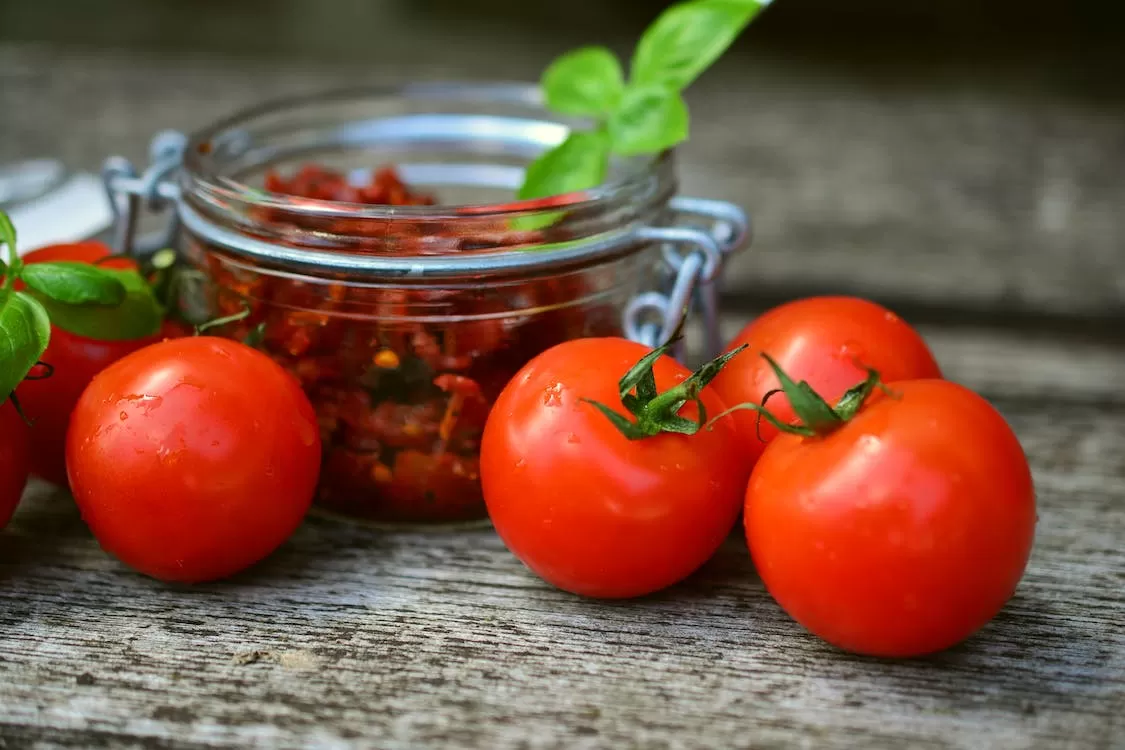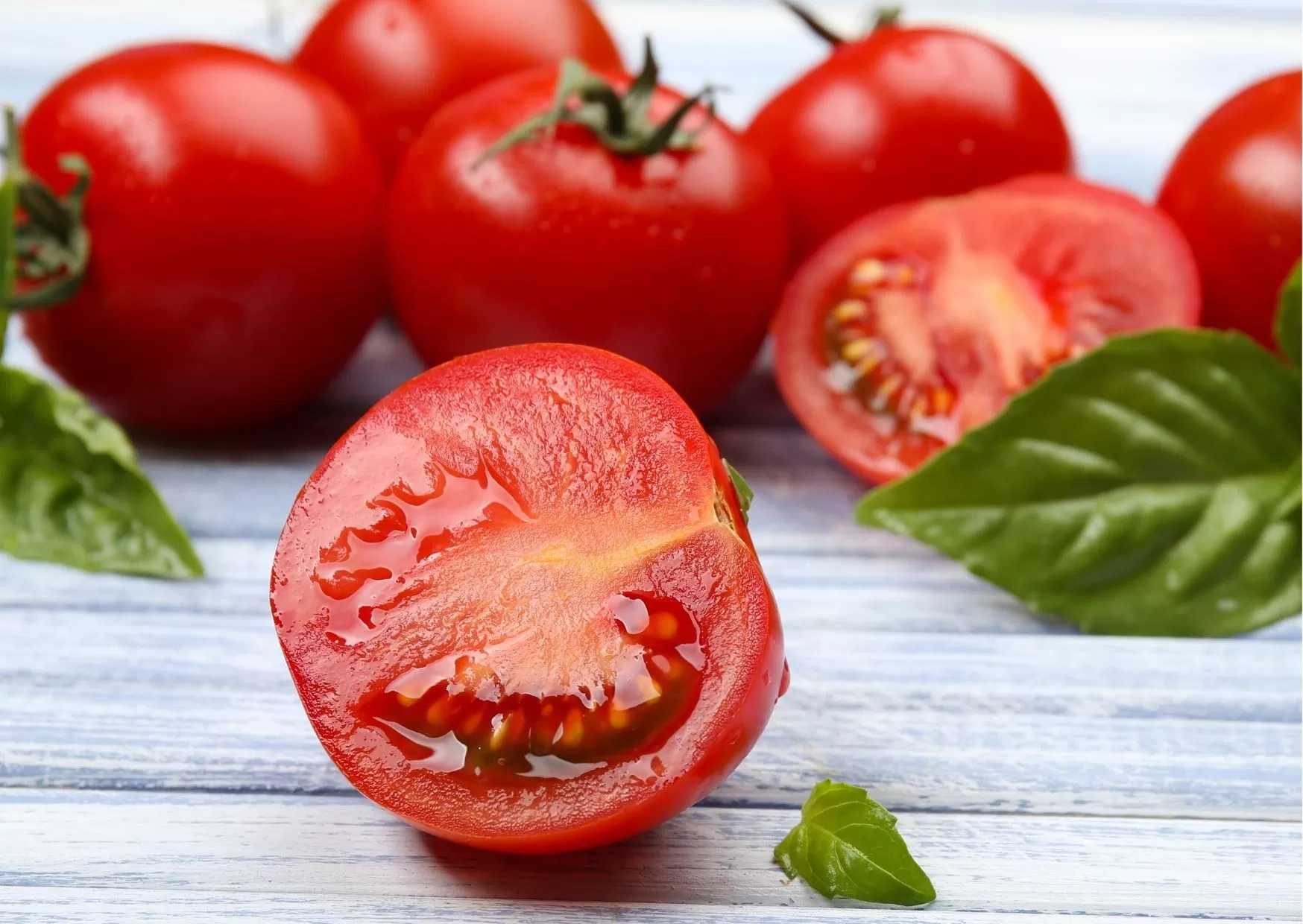- 0086-571-85302990
- sales@greenskybio.com
where does lycopene come from
2023-09-28

1. Natural Sources of Lycopene
1. Natural Sources of Lycopene
Lycopene is a powerful antioxidant and a carotenoid pigment found naturally in a variety of fruits and vegetables. It is responsible for the red color in many of these foods. Lycopene has gained significant attention for its potential health benefits, including its role in reducing the risk of certain cancers, heart disease, and other chronic conditions. Understanding the natural sources of lycopene is essential for incorporating this nutrient into a balanced diet.
2. Tomatoes: The Primary Source
Tomatoes are the most well-known and primary source of lycopene. They contain a high concentration of this beneficial compound, making them an excellent dietary choice for those looking to increase their lycopene intake. Both fresh and processed tomatoes, such as canned tomatoes, tomato sauce, and tomato paste, are rich in lycopene. The processing of tomatoes can actually increase the bioavailability of lycopene, making it easier for the body to absorb and utilize this nutrient.
3. Other Fruits and Vegetables Rich in Lycopene
While tomatoes are the primary source, other fruits and vegetables also contain lycopene. Some of these include:
- Watermelon: This refreshing fruit is another significant source of lycopene, and its sweet taste makes it a popular choice for snacks and desserts.
- Grapefruit: Both red and pink varieties of grapefruit contain lycopene, with the red and pink types having higher concentrations.
- Guava: This tropical fruit is not only delicious but also packed with lycopene and other nutrients.
- Papaya: Rich in lycopene, papaya is a versatile fruit that can be eaten fresh or used in a variety of dishes.
- Red Bell Peppers: These peppers are a good source of lycopene and can be used in salads, stir-fries, and other dishes.
- Pink Grapefruit: Similar to watermelon, pink grapefruit is a good source of lycopene and offers a tangy flavor.
4. Benefits of Lycopene Consumption
Lycopene has been linked to numerous health benefits due to its antioxidant properties. Some of these benefits include:
- Reduced risk of certain cancers: Studies have shown that lycopene may help reduce the risk of prostate, lung, and stomach cancers.
- Improved heart health: Lycopene can help lower bad cholesterol levels and reduce the risk of heart disease.
- Anti-inflammatory effects: Lycopene has been found to have anti-inflammatory properties, which can help reduce inflammation in the body.
- Enhanced skin health: As an antioxidant, lycopene can help protect the skin from damage caused by free radicals and UV radiation.
5. Lycopene and Health: Scientific Research
Research on lycopene has been growing, with numerous studies exploring its potential health benefits. Some key findings from scientific research include:
- A study published in the journal "Cancer Research" found that men with higher lycopene intake had a reduced risk of prostate cancer.
- Another study in the "American Journal of Clinical Nutrition" showed that lycopene supplementation improved blood pressure and arterial function in individuals with metabolic syndrome.
- A review in the "Journal of Nutrition" highlighted the potential role of lycopene in reducing oxidative stress and inflammation, which are linked to various chronic diseases.
6. How to Increase Lycopene Intake
To increase lycopene intake, consider the following tips:
- Incorporate more tomatoes and tomato-based products into your diet.
- Add watermelon, guava, and papaya to your fruit intake.
- Include red and pink grapefruit, as well as red bell peppers, in your meals.
- Opt for cooked or processed tomatoes, as this can enhance lycopene bioavailability.
7. Cooking Methods and Lycopene Absorption
The way in which tomatoes and other lycopene-rich foods are prepared can impact their bioavailability. Cooking methods that increase lycopene absorption include:
- Cooking tomatoes with a small amount of oil can help increase the body's ability to absorb lycopene.
- Processing tomatoes, such as in canned tomatoes or tomato sauce, can also improve lycopene bioavailability.
- Heating foods containing lycopene, like red bell peppers, can make the nutrient more accessible for absorption.
8. Lycopene Supplements: Pros and Cons
While it is possible to obtain lycopene through supplements, there are pros and cons to consider:
Pros:
- Supplements can provide a concentrated source of lycopene, making it easier to reach recommended intake levels.
- They can be a convenient option for those with limited access to fresh produce or who have difficulty consuming enough lycopene-rich foods.
Cons:
- Supplements may not provide the same range of nutrients found in whole foods.
- The effectiveness of lycopene supplements is still being researched, and their long-term benefits are not yet fully understood.
9. Conclusion and Recommendations
Lycopene is a valuable nutrient with numerous health benefits. By understanding its natural sources and incorporating them into your diet, you can increase your lycopene intake and potentially improve your overall health. While supplements are an option, it is generally recommended to obtain lycopene from whole foods whenever possible. Cooking methods that enhance lycopene bioavailability, such as cooking with oil or processing tomatoes, can also be beneficial. As always, consult with a healthcare professional before making significant changes to your diet or supplement regimen.
2. Tomatoes: The Primary Source
2. Tomatoes: The Primary Source
Tomatoes are the most well-known and significant dietary source of lycopene. This powerful antioxidant is naturally abundant in tomatoes and tomato-based products. Lycopene content varies depending on the type of tomato and its ripeness. Riper tomatoes generally have higher levels of lycopene compared to unripe ones.
Different Types of Tomatoes:
- Roma Tomatoes: Often used for cooking, Roma tomatoes have a high lycopene content due to their dense flesh and low water content.
- Cherry Tomatoes: Smaller in size but packed with flavor and lycopene, cherry tomatoes are a popular snack and ingredient in salads.
- Beefsteak Tomatoes: Known for their large size and juicy flesh, beefsteak tomatoes also contain a substantial amount of lycopene.
Tomato Products:
- Tomato Sauce: Processed from tomatoes, tomato sauce is a staple in many cuisines and is a concentrated source of lycopene.
- Tomato Paste: Made by cooking tomatoes down to a thick paste, it is used in a variety of dishes and has a high concentration of lycopene.
- Tomato Juice: Consumed as a drink or used in cooking, tomato juice is another way to benefit from lycopene.
- Canned Tomatoes: Canned versions of whole tomatoes or tomato products can be a convenient way to include lycopene in your diet.
Factors Affecting Lycopene Content:
- Ripening: As tomatoes ripen, their lycopene content increases.
- Season: Tomatoes grown in the summer months tend to have higher lycopene levels due to increased sunlight exposure.
- Cooking: Cooking tomatoes can increase the bioavailability of lycopene, making it easier for the body to absorb.
Importance of Tomatoes in Lycopene Intake:
Tomatoes are not only a primary source of lycopene but also a versatile ingredient that can be incorporated into a variety of dishes. From salads to pasta sauces, soups to stews, the use of tomatoes is widespread across global cuisines. This makes it relatively easy to increase lycopene intake through a diet rich in tomato-based foods.
In the next sections, we will explore other sources of lycopene, the benefits of its consumption, and how to maximize its absorption through various methods.
3. Other Fruits and Vegetables Rich in Lycopene
3. Other Fruits and Vegetables Rich in Lycopene
While tomatoes are the most well-known source of lycopene, there are several other fruits and vegetables that also contain this powerful antioxidant. These alternative sources can be a great way to diversify your diet and ensure you're getting enough lycopene.
Watermelon: This refreshing fruit is not only a great source of hydration, but it also contains a significant amount of lycopene. The pink flesh of watermelon is rich in this nutrient, making it a delicious and healthy choice for a snack or dessert.
Grapefruit: Both red and pink varieties of grapefruit contain lycopene. The vibrant color of the fruit is an indication of its lycopene content. Including grapefruit in your diet can provide a boost of this beneficial compound.
Guava: This tropical fruit is not only delicious but also packed with lycopene. Guava's vibrant color and sweet taste make it a popular choice in many cuisines around the world.
Papaya: Known for its digestive enzyme content, papaya is also a good source of lycopene. The bright orange flesh of this fruit is rich in this antioxidant, making it a nutritious addition to your diet.
Red Cabbage: This cruciferous vegetable is not only a staple in many dishes but also contains lycopene. Its deep red color is a testament to its antioxidant content.
Pink Grapes: Similar to grapefruit, the color of red grapes indicates the presence of lycopene. These grapes can be enjoyed fresh or used in a variety of dishes.
Apricots: The orange hue of apricots is due to their lycopene content. These fruits are a tasty way to increase your lycopene intake.
Raspberries: While not as high in lycopene as some other fruits, raspberries do contain small amounts of this nutrient. They can be a tasty addition to a lycopene-rich diet.
Pink Peppercorns: This unique spice not only adds flavor to dishes but also provides a boost of lycopene.
Incorporating a variety of these fruits and vegetables into your diet can help ensure you're getting enough lycopene to support your health. Each of these foods not only contributes to your lycopene intake but also brings a range of other nutrients and health benefits to your table.
4. Benefits of Lycopene Consumption
4. Benefits of Lycopene Consumption
Lycopene is a powerful antioxidant that offers a wide range of health benefits. Its consumption is associated with improved cardiovascular health, enhanced immune function, and a reduced risk of certain cancers. Here are some of the key benefits of lycopene consumption:
1. Cardiovascular Health: Lycopene has been shown to reduce the risk of heart disease by lowering bad cholesterol levels and reducing inflammation. It also helps to prevent the oxidation of LDL cholesterol, which can lead to plaque buildup in the arteries.
2. Cancer Prevention: Studies have indicated that lycopene may help prevent certain types of cancer, including prostate, lung, and stomach cancers. Its antioxidant properties help neutralize free radicals that can damage cells and lead to cancer.
3. Eye Health: Lycopene is known to support eye health by protecting against age-related macular degeneration and cataracts. Its antioxidant action helps to reduce oxidative stress in the eyes.
4. Skin Health: The antioxidant properties of lycopene can help protect the skin from harmful UV radiation, reducing the risk of skin damage and skin cancer. It also contributes to skin health by promoting collagen production.
5. Bone Health: Lycopene may contribute to bone health by promoting bone mineralization and reducing bone loss, which can help prevent osteoporosis.
6. Anti-Inflammatory Effects: Lycopene has anti-inflammatory properties that can help reduce inflammation in the body, which is beneficial for conditions like arthritis.
7. Immune System Support: Lycopene can help boost the immune system by enhancing the activity of immune cells and reducing oxidative stress.
8. Improvement in Fertility: Some research suggests that lycopene may improve sperm quality and fertility in men.
9. Neuroprotection: Lycopene has been found to have neuroprotective effects, potentially reducing the risk of neurodegenerative diseases like Alzheimer's and Parkinson's.
10. Anti-Aging Properties: Due to its antioxidant capabilities, lycopene can help slow down the aging process by protecting cells from damage.
Incorporating lycopene-rich foods into your diet can provide these health benefits and contribute to overall wellness. It's important to consume a variety of lycopene sources to ensure you're getting the full range of benefits this nutrient has to offer.
5. Lycopene and Health: Scientific Research
5. Lycopene and Health: Scientific Research
Lycopene has been the subject of numerous scientific studies due to its potential health benefits. Research has shown that this powerful antioxidant can have a positive impact on various aspects of health, including:
Cardiovascular Health
One of the most well-documented benefits of lycopene is its ability to support cardiovascular health. Studies have suggested that lycopene can help lower the risk of heart disease by reducing inflammation, improving blood vessel function, and decreasing the oxidation of LDL ("bad") cholesterol.
In a study published in the journal "Circulation," researchers found that higher intakes of lycopene were associated with a reduced risk of coronary heart disease. Another study in the "American Journal of Clinical Nutrition" reported that lycopene supplementation could improve endothelial function, which is crucial for maintaining healthy blood vessels.
Cancer Prevention
Lycopene's antioxidant properties have also been linked to cancer prevention. Several studies have shown that higher intakes of lycopene may reduce the risk of certain types of cancer, including prostate, lung, and stomach cancer.
A meta-analysis published in the "Journal of the National Cancer Institute" found that higher dietary intakes of lycopene were associated with a reduced risk of prostate cancer. Similarly, a study in the "European Journal of Cancer Prevention" suggested that lycopene could help prevent lung cancer by reducing oxidative stress and inflammation.
Skin Health
Lycopene's antioxidant and anti-inflammatory properties can also benefit skin health. Research has shown that lycopene can help protect the skin from the harmful effects of UV radiation, reduce the risk of skin cancer, and improve skin hydration and elasticity.
In a study published in the "Journal of Cosmetic Dermatology," researchers found that topical application of lycopene could improve skin hydration and reduce the appearance of fine lines and wrinkles. Another study in the "Journal of Investigative Dermatology" suggested that lycopene could help protect the skin from UV-induced damage and reduce the risk of skin cancer.
Bone Health
Emerging research has also suggested that lycopene may play a role in maintaining bone health. Studies have shown that lycopene can help increase bone mineral density and reduce the risk of osteoporosis.
In a study published in the "Journal of Clinical Endocrinology & Metabolism," researchers found that lycopene supplementation could improve bone mineral density in postmenopausal women. Another study in the "Journal of Bone and Mineral Research" suggested that lycopene could help protect against bone loss by reducing oxidative stress and inflammation.
Other Health Benefits
In addition to these benefits, lycopene has also been linked to other health benefits, such as improving fertility, reducing the risk of diabetes, and promoting cognitive health.
While more research is needed to fully understand the extent of lycopene's health benefits, the current body of scientific evidence suggests that incorporating lycopene-rich foods into your diet can have a positive impact on overall health and well-being.
6. How to Increase Lycopene Intake
6. How to Increase Lycopene Intake
To effectively increase your lycopene intake, it's essential to incorporate a variety of lycopene-rich foods into your diet. Here are some practical strategies to help you boost your lycopene consumption:
1. Incorporate Tomatoes into Your Diet:
Since tomatoes are the primary source of lycopene, make sure to include them in your meals regularly. You can use fresh tomatoes in salads, sandwiches, pasta dishes, or simply enjoy them as a snack. Canned tomatoes, tomato sauce, and tomato paste are also excellent sources, especially when cooked, as the heat can increase the bioavailability of lycopene.
2. Explore Other Lycopene-Rich Foods:
In addition to tomatoes, there are several other fruits and vegetables that are high in lycopene. Watermelon, pink grapefruit, guava, and papaya are all excellent choices. Incorporate these into your diet by adding them to fruit salads, smoothies, or as standalone snacks.
3. Cook with Lycopene-Rich Ingredients:
Cooking methods can impact the bioavailability of lycopene. For instance, cooking tomatoes can increase the amount of lycopene your body can absorb. Try incorporating cooked tomato-based dishes into your meal plan, such as soups, stews, and sauces.
4. Opt for Lycopene-Enriched Products:
Some products are specifically enriched with lycopene, such as certain types of juices and supplements. While these can be a convenient way to increase your intake, it's important to read labels carefully and choose products that align with your dietary needs and preferences.
5. Combine with Healthy Fats:
Lycopene is a fat-soluble nutrient, which means it is better absorbed when consumed with a source of healthy fats. Pair tomatoes or other lycopene-rich foods with a drizzle of olive oil, avocado, or a handful of nuts to enhance absorption.
6. Diversify Your Fruit and Vegetable Choices:
Don't limit yourself to just a few sources of lycopene. Aim for a diverse diet that includes a wide range of fruits and vegetables to ensure you're getting a broad spectrum of nutrients, including lycopene.
7. Monitor Portion Sizes:
While it's beneficial to consume more lycopene, it's also important to be mindful of portion sizes to avoid overeating or consuming too many calories. Use the recommended daily intake as a guide and adjust your portions accordingly.
8. Educate Yourself on Lycopene Content:
Learn more about the lycopene content in different foods to make informed choices when shopping for groceries and planning meals. This knowledge can help you optimize your lycopene intake.
9. Consult a Nutritionist or Dietitian:
If you're unsure about how to increase your lycopene intake or have specific dietary needs, consider consulting a nutritionist or dietitian. They can provide personalized advice and meal planning assistance.
By following these strategies, you can effectively increase your lycopene intake and enjoy the potential health benefits associated with this powerful antioxidant. Remember, a balanced diet that includes a variety of lycopene-rich foods is key to maximizing the benefits of this nutrient.
7. Cooking Methods and Lycopene Absorption
7. Cooking Methods and Lycopene Absorption
Lycopene is a delicate phytochemical that can be influenced by various cooking methods. The way in which tomatoes and other lycopene-rich foods are prepared can significantly impact the bioavailability and absorption of this powerful antioxidant in the body. Here's a look at how different cooking techniques affect lycopene absorption:
Steaming
Steaming is one of the best methods for preserving lycopene content in tomatoes and other fruits and vegetables. This cooking technique involves using steam to cook the food, which helps to retain the nutrients without adding any fat or calories. Steaming also makes the cell walls of the produce more permeable, potentially increasing the bioavailability of lycopene.
Boiling
Boiling can lead to some loss of lycopene due to the leaching of nutrients into the cooking water. However, the process of boiling can also break down cell walls, which may enhance the release of lycopene and improve its absorption. To minimize nutrient loss, it's recommended to use the cooking water in soups or sauces.
Baking and Roasting
Baking and roasting tomatoes can increase the concentration of lycopene as the water content decreases, making the fruit more concentrated in lycopene. The heat from these cooking methods also helps to break down the cell walls, which can improve the bioavailability of lycopene. Additionally, cooking tomatoes with a small amount of oil can enhance the absorption of lycopene, as fat aids in the transport of fat-soluble nutrients.
Canning and Processing
Canned tomatoes and tomato products can be a convenient source of lycopene. The canning process involves heating, which can break down cell walls and increase the availability of lycopene. However, some loss of lycopene may occur during processing and storage. It's important to choose high-quality, low-sodium canned tomatoes to maximize the health benefits.
Fresh Consumption
While consuming tomatoes and other lycopene-rich foods in their fresh form ensures maximum nutrient retention, it's important to note that the bioavailability of lycopene may be lower compared to cooked forms. Chewing and mechanical disruption of the food can help release lycopene, but the presence of fat in the diet is still crucial for optimal absorption.
Conclusion
The best cooking methods for preserving and enhancing lycopene absorption are steaming, baking, and roasting. These techniques help to break down cell walls and concentrate the lycopene content. To maximize the health benefits of lycopene, it's recommended to include a variety of tomato and other lycopene-rich foods in your diet, prepared using different cooking methods. Additionally, consuming these foods with a source of healthy fat, such as olive oil or avocado, can further improve the absorption of this powerful antioxidant.
8. Lycopene Supplements: Pros and Cons
8. Lycopene Supplements: Pros and Cons
Lycopene supplements are a popular option for those looking to increase their intake of this powerful antioxidant. While these supplements can provide a concentrated dose of lycopene, there are pros and cons to consider.
Pros of Lycopene Supplements:
1. Convenience: Supplements offer a quick and easy way to boost lycopene levels without the need to consume large quantities of fruits and vegetables.
2. Controlled Dosage: With supplements, you can precisely control the amount of lycopene you are consuming, which can be especially beneficial for those with specific health goals or requirements.
3. Purity: Supplements are often standardized to ensure a consistent and high-quality product, free from contaminants that might be found in natural sources.
4. Accessibility: For those who have difficulty consuming fresh produce due to dietary restrictions or allergies, supplements can be a convenient alternative.
Cons of Lycopene Supplements:
1. Lack of Whole Foods Benefits: Supplements do not provide the full range of nutrients and fiber found in whole foods. Consuming lycopene through natural sources ensures you get a variety of other beneficial compounds.
2. Cost: Over time, the cost of supplements can add up, and they may not be as affordable as incorporating more lycopene-rich foods into your diet.
3. Quality Variability: Not all supplements are created equal. The quality and effectiveness of lycopene supplements can vary widely, and some may not be as potent as advertised.
4. Potential Interactions: As with any supplement, there is a risk of interactions with other medications or health conditions. It's important to consult with a healthcare provider before starting any new supplement regimen.
Balancing Natural Intake with Supplements:
While supplements can be a useful tool for increasing lycopene intake, they should not replace a balanced diet rich in fruits and vegetables. The best approach is often a combination of both, ensuring that you get the full spectrum of nutrients and the benefits of a varied diet.
In conclusion, lycopene supplements can be a beneficial addition to your health regimen, but they should be used with caution and as part of a broader strategy that includes a diet rich in lycopene-containing foods. Always consult with a healthcare professional before starting any new supplement to ensure it's the right choice for your individual needs.
9. Conclusion and Recommendations
9. Conclusion and Recommendations
In conclusion, lycopene is a powerful antioxidant and carotenoid that offers numerous health benefits, including its potential role in reducing the risk of certain cancers, promoting heart health, and supporting skin health. Understanding where lycopene comes from and how to incorporate it into your diet is essential for maximizing these benefits.
Recommendations:
1. Increase Tomato Intake: Since tomatoes are the primary source of lycopene, aim to include them in your diet regularly. Fresh, cooked, or in the form of tomato sauce, they are versatile and can be used in various dishes.
2. Diversify Your Fruit and Vegetable Choices: While tomatoes are the richest source, don't overlook other fruits and vegetables that contain lycopene. Incorporating a variety of these into your meals can provide a range of nutrients and antioxidants.
3. Cooking Methods: Cooking tomatoes and other lycopene-rich foods can enhance the bioavailability of lycopene. Try incorporating cooked tomato-based dishes into your diet to improve absorption.
4. Consider Supplements with Caution: While lycopene supplements can be beneficial, they should not replace a balanced diet rich in fruits and vegetables. Consult with a healthcare provider before starting any supplement regimen.
5. Monitor Portion Sizes: Even though lycopene is fat-soluble and can be better absorbed with the presence of dietary fat, it's still important to maintain healthy eating habits and not overconsume high-fat foods.
6. Regular Health Check-ups: While a diet rich in lycopene can contribute to overall health, regular health check-ups are crucial for early detection and prevention of diseases.
7. Lifestyle Factors: Combine a lycopene-rich diet with other healthy lifestyle practices such as regular exercise, adequate sleep, and stress management for optimal health.
8. Stay Informed: As research on lycopene and its health benefits continues to evolve, stay updated on the latest findings to make informed decisions about your diet and health.
By following these recommendations, you can ensure that you are not only getting the benefits of lycopene but also maintaining a balanced and healthy lifestyle. Remember, the key to a healthy diet is variety and moderation, and lycopene is just one of many nutrients that contribute to a well-rounded approach to nutrition.
- ▶ Hesperidin
- ▶ citrus bioflavonoids
- ▶ plant extract
- ▶ lycopene
- ▶ Diosmin
- ▶ Grape seed extract
- ▶ Sea buckthorn Juice Powder
- ▶ Beetroot powder
- ▶ Hops Extract
- ▶ Artichoke Extract
- ▶ Reishi mushroom extract
- ▶ Astaxanthin
- ▶ Green Tea Extract
- ▶ Curcumin Extract
- ▶ Horse Chestnut Extract
- ▶ Other Problems
- ▶ Boswellia Serrata Extract
- ▶ Resveratrol Extract
- ▶ Marigold Extract
- ▶ Grape Leaf Extract
- ▶ blog3
- ▶ blog4
- ▶ blog5
-
Does lycopene increase testosterone?
2023-09-28
-
Which fruit is rich in lycopene?
2023-09-28
-
Does lycopene help sperm?
2023-09-28
-
What does lycopene do for your skin?
2023-09-28
-
Why Do Men Need Lycopene?
2023-09-28
-
What Is Lycopene Useful For?
2023-09-28
-
What food has the highest lycopene?
2023-09-28
-
Sea buckthorn Juice Powder
2023-09-28
-
Lotus leaf extract
2023-09-28
-
Saponin Extract
2023-09-28
-
Tongkat Ali Extract Powder
2023-09-28
-
Maitake Mushroom Extract
2023-09-28
-
Curcumin
2023-09-28
-
Kelp Extract Powder
2023-09-28
-
Boswellia Serrata Extract
2023-09-28
-
Saw Palmetto Extract
2023-09-28
-
Black Garlic Extract
2023-09-28































